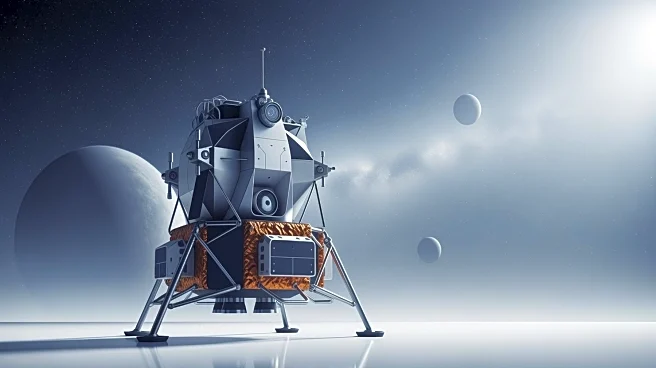What's Happening?
NASA has announced the reopening of the Human Landing System (HLS) contract for the Artemis 3 lunar mission due to concerns over SpaceX's Starship HLS development timeline. Interim NASA Administrator Sean
Duffy expressed urgency in achieving a lunar landing within the current presidential term, citing competition with China. SpaceX's Starship HLS requires several critical demonstrations, including orbital propellant transfer and an uncrewed lunar landing, to achieve human-rating. The White House prioritizes Artemis as a strategic step towards Mars, proposing budget reallocations from science missions to support these objectives. NASA has enlisted private sector partnerships, including SpaceX and Blue Origin, to develop HLS for future Artemis missions.
Why It's Important?
The reopening of the Artemis 3 HLS contract underscores the strategic importance of the Artemis program in U.S. space exploration efforts. The decision reflects the urgency to maintain U.S. leadership in space amid growing competition from China, which plans its own moon landing by 2030. The Artemis program is seen as a stepping stone to Mars, aligning with broader goals of human space exploration. Budget reallocations from science missions to support Artemis highlight the prioritization of human space exploration over other scientific endeavors. The outcome of this contract could significantly impact the timeline and success of U.S. lunar missions, influencing future space policy and international space race dynamics.
What's Next?
NASA's decision to reopen the Artemis 3 HLS contract may lead to increased competition among private sector companies, potentially accelerating technological advancements and innovation in lunar landing systems. SpaceX must achieve several milestones, including propellant transfer and an uncrewed lunar landing demonstration, to secure its position in the Artemis program. The White House's focus on Artemis as a priority suggests continued support and funding for human space exploration initiatives. The outcome of this contract could influence future collaborations and partnerships in space exploration, shaping the trajectory of U.S. efforts to return to the moon and eventually reach Mars.
Beyond the Headlines
The reopening of the Artemis 3 HLS contract highlights the ethical and strategic considerations in prioritizing human space exploration over scientific missions. The decision to reallocate budget from science missions to support Artemis raises questions about the balance between exploration and scientific research. The competition with China adds a geopolitical dimension to the Artemis program, emphasizing the role of space exploration in national security and international relations. The involvement of private sector companies in developing HLS reflects the growing trend of public-private partnerships in space exploration, potentially influencing future policy and industry dynamics.









